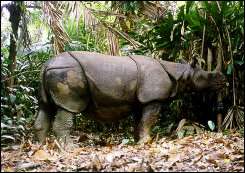July 21, 2015 weblog
New technology to help prevent rhino poaching

A new group of technologies packaged together and called Rapid (Real-Time Anti-Poaching Intelligence Device) by its makers is on track to reduce poaching of rhinos, primarily in South Africa. The system was invented by British scientist Paul O'Donoghue—he and fellow scientist Christian Rutz, both of the University of St. Andrews have published an article in the Journal of Applied Ecology, describing the current state of poaching in Africa and how the new device might put a stop to it.
The system consists of a camera that can be embedded in a rhino's horn and a heart monitoring device that is connected to an alarm system and GPS tracking unit. The heart monitor would go off, the authors report, if the rhino was approached by poachers—that would set off an alarm that would be sent directly to a team of armed conservationists who would jump into a helicopter and rush to the scene. If they are too late to stop the killing, they would at least be able to catch the poachers in the act, and hopefully retrieve evidence of the crime from the camera. Because of the fast response time, it would make poaching an extremely dangerous proposition. They note that extensive testing has been done with placement of the camera in the horn, which requires drilling—they insist that the rhinos experience no pain during the procedure.
Rhinos are in serious danger—there are only about 25,000 of them left in the wild, the majority of which live in South Africa. Officials there have reported that approximately 1000 of the animals are killed every year, primarily for their horn, which some Asian cultures value very highly. It is believed that if the poaching is not halted, rhinos will cease to exist in the wild as soon as 2035. To protect the rhinos with the new device, rangers would have to catch each one, install the system and then release the animals back into the wild.
O'Donoghue and Rutz believe their system can be adapted for use with other animals, such as tigers and elephants, two other animals that are being poached so heavily that they too may become extinct if something is not done to reverse the practice. Humane Society International is helping to fund the project.
Journal information: Journal of Applied Ecology
© 2015 Phys.org. All rights reserved.


















